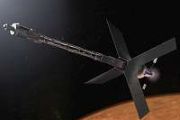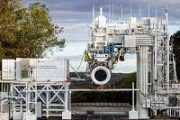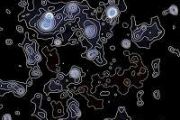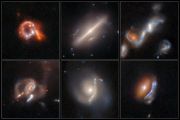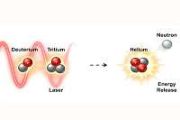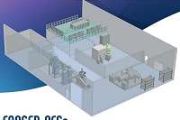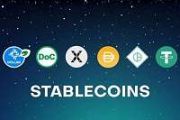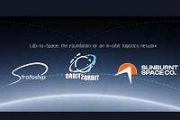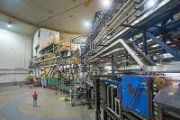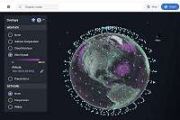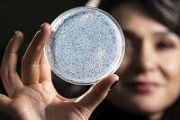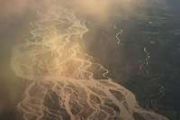
Copernical Team
NASA Rockets Launch from Australia to Seek Habitable Star Conditions
 A NASA Black Brant IX suborbital sounding rocket was successfully launched at 9:47 a.m. EDT (11:17 p.m. ACST) July 6, 2022, from the Arnhem Space Centre (ASC) in the Northern Territory of Australia. The launch was for the Suborbital Imaging Spectrograph for Transition region Irradiance from Nearby Exoplanet host stars, or SISTINE, mission for the University of Colorado, Boulder. Preliminary anal
A NASA Black Brant IX suborbital sounding rocket was successfully launched at 9:47 a.m. EDT (11:17 p.m. ACST) July 6, 2022, from the Arnhem Space Centre (ASC) in the Northern Territory of Australia. The launch was for the Suborbital Imaging Spectrograph for Transition region Irradiance from Nearby Exoplanet host stars, or SISTINE, mission for the University of Colorado, Boulder. Preliminary anal Scientists discover how first quasars in universe formed
 The mystery of how the first quasars in the universe formed - something that has baffled scientists for nearly 20 years - has now been solved by a team of astrophysicists whose findings are published in Nature.
The existence of over 200 quasars powered by supermassive black holes less than a billion years after the Big Bang had remained one of the outstanding problems in astrophysics becau
The mystery of how the first quasars in the universe formed - something that has baffled scientists for nearly 20 years - has now been solved by a team of astrophysicists whose findings are published in Nature.
The existence of over 200 quasars powered by supermassive black holes less than a billion years after the Big Bang had remained one of the outstanding problems in astrophysics becau Humans on Mars: Pathways toward sustainable settlement
 Is sustainable human exploration of Mars possible? How will humans affect the new environment? Around 60 researchers from the University of Bremen and other institutes are investigating these questions as part of an initiative.
On July 8, 2022, the University of Bremen is set to launch its large-scale initiative "Humans on Mars - Pathways Toward a Long-Term Sustainable Exploration and Sett
Is sustainable human exploration of Mars possible? How will humans affect the new environment? Around 60 researchers from the University of Bremen and other institutes are investigating these questions as part of an initiative.
On July 8, 2022, the University of Bremen is set to launch its large-scale initiative "Humans on Mars - Pathways Toward a Long-Term Sustainable Exploration and Sett Sometimes things get complicated
 Perseverance has a big job to do while roving across Jezero and exploring the Delta Front, which is campaign #2 of the mission. One of the major goals of this mission (and campaign) is searching for evidence of past life, and we know from studying deltas on Earth that fine-grained clay-rich rocks in these environments are some of the best at preserving ancient biomarkers. Biomarkers, or "molecul
Perseverance has a big job to do while roving across Jezero and exploring the Delta Front, which is campaign #2 of the mission. One of the major goals of this mission (and campaign) is searching for evidence of past life, and we know from studying deltas on Earth that fine-grained clay-rich rocks in these environments are some of the best at preserving ancient biomarkers. Biomarkers, or "molecul China's Chang'e 4 probe completes work for 44th lunar day
 The lander and the rover of the Chang'e 4 probe have been switched to dormant mode for the lunar night after working stably for a 44th lunar day.
The lander was switched to dormant mode at 6:00 am Wednesday (Beijing Time), and the rover, Yutu-2, at 7:14 pm Tuesday, according to the Lunar Exploration and Space Program Center of the China National Space Administration.
A lunar day is e
The lander and the rover of the Chang'e 4 probe have been switched to dormant mode for the lunar night after working stably for a 44th lunar day.
The lander was switched to dormant mode at 6:00 am Wednesday (Beijing Time), and the rover, Yutu-2, at 7:14 pm Tuesday, according to the Lunar Exploration and Space Program Center of the China National Space Administration.
A lunar day is e Researchers ascertain forming of world's longest meteorite-strewn field
 Chinese researchers have studied the large meteorite irons to ascertain the world's longest meteorite-strewn field in Altay, northwest China's Xinjiang Uygur Autonomous Region.
China has successively discovered the meteorite irons at a weight of 28 tonnes, 23 tonnes, 18 tonnes, five tonnes and 0.43 tonnes in Altay. The massive Altay irons were found to comprise the longest known strewn fie
Chinese researchers have studied the large meteorite irons to ascertain the world's longest meteorite-strewn field in Altay, northwest China's Xinjiang Uygur Autonomous Region.
China has successively discovered the meteorite irons at a weight of 28 tonnes, 23 tonnes, 18 tonnes, five tonnes and 0.43 tonnes in Altay. The massive Altay irons were found to comprise the longest known strewn fie A Plan Fit for a Rover Sols 3525-3527
 Tosol's plan included a little bit of everything, with more than four hours of remote science spread over three sols. However, the rover is still in the midst of the Avanavero drill campaign, so all desired observations had to be strategically fit in around important drill-related SAM and CheMin activities.
Remote science observations also sometimes come with their own timing constraints,
Tosol's plan included a little bit of everything, with more than four hours of remote science spread over three sols. However, the rover is still in the midst of the Avanavero drill campaign, so all desired observations had to be strategically fit in around important drill-related SAM and CheMin activities.
Remote science observations also sometimes come with their own timing constraints, Australia's space future blasts off from Nhulunbuy
 Australia has taken another step towards becoming a serious contributor to the global space economy with the launch of a NASA sounding rocket from the Arnhem Space Center at Nhulunbuy in the Northern Territory. Australia's rapidly growing space enterprise will provide benefits well above our economic and strategic weight. Establishing a sovereign launch capability is a vital early step.
Th
Australia has taken another step towards becoming a serious contributor to the global space economy with the launch of a NASA sounding rocket from the Arnhem Space Center at Nhulunbuy in the Northern Territory. Australia's rapidly growing space enterprise will provide benefits well above our economic and strategic weight. Establishing a sovereign launch capability is a vital early step.
Th Commercial space launch site begins construction
 China's first space launch site dedicated to commercial missions started construction in Wenchang, a coastal city in Hainan province, on Wednesday, according to the provincial government.
The Hainan Commercial Space Launch Site program is a joint venture of the Hainan government and three State-owned space conglomerates-China Aerospace Science and Technology Corp, China Aerospace Science a
China's first space launch site dedicated to commercial missions started construction in Wenchang, a coastal city in Hainan province, on Wednesday, according to the provincial government.
The Hainan Commercial Space Launch Site program is a joint venture of the Hainan government and three State-owned space conglomerates-China Aerospace Science and Technology Corp, China Aerospace Science a Rocket Lab Introduces Responsive Space Program
 Rocket Lab USA, Inc. (Nasdaq: RKLB) has announced it is introducing a Responsive Space Program designed to on-ramp commercial and government satellite operators to the Company's 24/7 rapid call-up launch capability and streamlined satellite build and operation options.
"Satellites are vulnerable to natural degradation, accidents, technical failure, and deliberate actions. Unexpectedly losi
Rocket Lab USA, Inc. (Nasdaq: RKLB) has announced it is introducing a Responsive Space Program designed to on-ramp commercial and government satellite operators to the Company's 24/7 rapid call-up launch capability and streamlined satellite build and operation options.
"Satellites are vulnerable to natural degradation, accidents, technical failure, and deliberate actions. Unexpectedly losi 

